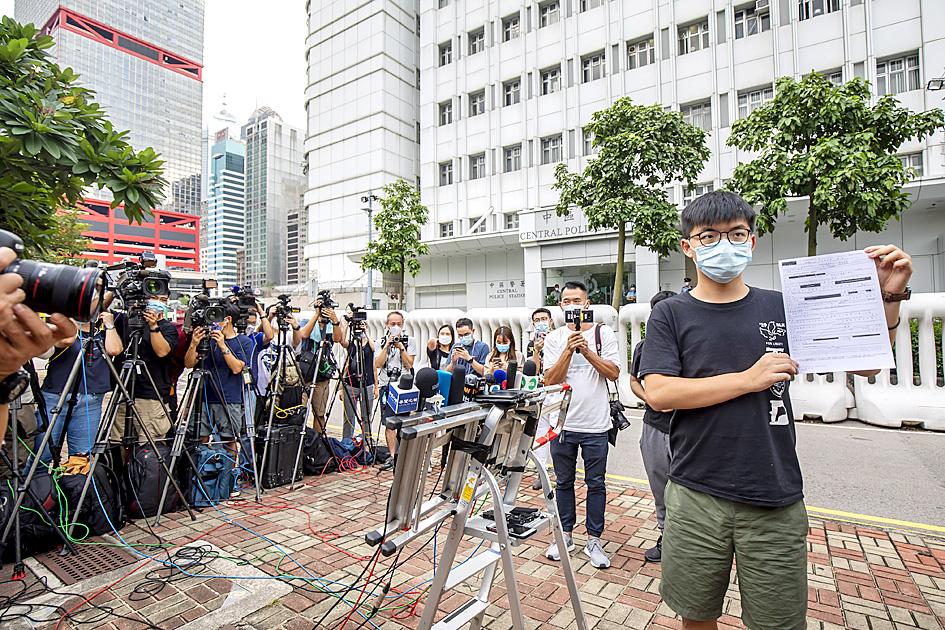Hong Kong police on Thursday arrested democracy activist Joshua Wong (黃之鋒) for participating in an unauthorized assembly in October last year and breaching the territory’s anti-mask law, according to a post on his official Twitter account.
Wong’s latest arrest adds to several unlawful assembly charges or suspected offenses he and other activists are facing related to last year’s pro-democracy protests, which prompted Beijing to impose a sweeping National Security Law on June 30.
Hong Kong police confirmed they arrested two men, aged 23 and 74, on Thursday for illegal assembly on Oct. 5 last year.

Photo: Bloomberg
Britain, which administered Hong Kong until a 1997 handover to China whose terms were agreed in a Joint Declaration between London and Beijing, expressed concern over Wong’s arrest.
“I am deeply concerned about the arrest of Joshua Wong, another example of HK authorities targeting activists,” British Secretary of State for Foreign and Commonwealth Affairs Dominic Raab said in a tweet.
“Chinese and HK authorities must respect the rights and freedoms of the people of Hong Kong, as protected in the Joint Declaration,” he said.
The arrest of Wong, 23, comes about six weeks after media tycoon Jimmy Lai (黎智英) was detained on suspicion of colluding with foreign forces.
Wong had been a frequent visitor to Washington where he appealed to the US Congress to support Hong Kong’s democracy movement and counter Beijing’s tightening grip over the global financial hub.
His visits drew the wrath of Beijing, which says he is a “black hand” of foreign forces.
Wong disbanded his pro-
democracy group Demosisto in June, just hours after China’s parliament passed the National Security Law for Hong Kong, bypassing the territory’s local legislature, a move widely criticized by Western governments.
His long-time colleague Agnes Chow (周庭), 21, and two other activists were among 10 people police arrested last month on suspicion of violating the new law.
The new law punishes anything China considers as subversion, secession, terrorism and collusion with foreign forces, with up to life in prison.
Wong was just 17 years old when he became the face of the 2014 student-led “Umbrella movement” democracy protests, but he was not a leading figure of the often violent unrest that shook the territory last year.
An anti-mask law was introduced last year in a bid to help police identify the protesters they suspected of committing crimes and it is facing a challenge in court.
In the meantime, the Hong Kong government has made masks mandatory in most circumstances due to the COVID-19 pandemic.

Shamans in Peru on Monday gathered for an annual New Year’s ritual where they made predictions for the year to come, including illness for US President Donald Trump and the downfall of Venezuelan President Nicolas Maduro. “The United States should prepare itself because Donald Trump will fall seriously ill,” Juan de Dios Garcia proclaimed as he gathered with other shamans on a beach in southern Lima, dressed in traditional Andean ponchos and headdresses, and sprinkling flowers on the sand. The shamans carried large posters of world leaders, over which they crossed swords and burned incense, some of which they stomped on. In this

Indonesia yesterday began enforcing its newly ratified penal code, replacing a Dutch-era criminal law that had governed the country for more than 80 years and marking a major shift in its legal landscape. Since proclaiming independence in 1945, the Southeast Asian country had continued to operate under a colonial framework widely criticized as outdated and misaligned with Indonesia’s social values. Efforts to revise the code stalled for decades as lawmakers debated how to balance human rights, religious norms and local traditions in the world’s most populous Muslim-majority nation. The 345-page Indonesian Penal Code, known as the KUHP, was passed in 2022. It

Near the entrance to the Panama Canal, a monument to China’s contributions to the interoceanic waterway was torn down on Saturday night by order of local authorities. The move comes as US President Donald Trump has made threats in the past few months to retake control of the canal, claiming Beijing has too much influence in its operations. In a surprising move that has been criticized by leaders in Panama and China, the mayor’s office of the locality of Arraijan ordered the demolition of the monument built in 2004 to symbolize friendship between the countries. The mayor’s office said in

‘TRUMP’S LONG GAME’: Minnesota Governor Tim Walz said that while fraud was a serious issue, the US president was politicizing it to defund programs for Minnesotans US President Donald Trump’s administration on Tuesday said it was auditing immigration cases involving US citizens of Somalian origin to detect fraud that could lead to denaturalization, or revocation of citizenship, while also announcing a freeze of childcare funds to Minnesota and demanding an audit of some daycare centers. “Under US law, if an individual procures citizenship on a fraudulent basis, that is grounds for denaturalization,” US Department of Homeland Security Assistant Secretary Tricia McLaughlin said in a statement. Denaturalization cases are rare and can take years. About 11 cases were pursued per year between 1990 and 2017, the Immigrant Legal Resource